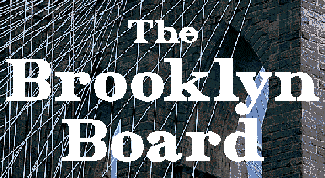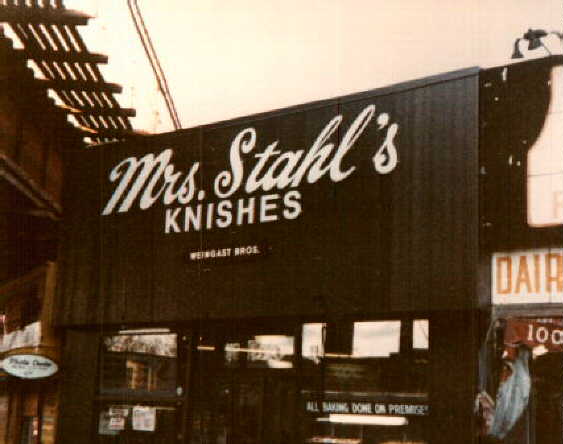
For displaced, misplaced, and nostalgic ex-Brooklynites |
|
Autumn by the Sea I n the early sixties, Erasmus was on split sessions. Freshmen were at some distant, mysterious Annex. Sophomores started class at 10:30 or 11:15 AM and were in school ‘til almost five and upper classmen started before 7AM and were done by 1:30 or so. Even with these abbreviated sessions, the humdrum world of academia would sometimes become unbearable and, by October, the urge to escape for a day away became irresistible. I'd wake up at the regular time, dress and get ready for school. My father left for work early so at the usual time I'd say goodbye to my mom and leave our apartment. I'd walk the one flight down and then grab the elevator for the 6th floor. If I made it unnoticed, I walk up the stairs to the roof. The heavy, metal clad door always creaked but never brought a response from any apartments. I'd sit near the edge and watch for my mom to leave the building and head for the car for her drive to teach at P.S. 115 in Canarsie. She seldom was parked on our block (alternate side of the street parking and all) but I would watch her until she was out of sight. Then I'd go down the stairs to drop off books and kill a little time. After I felt that the commuters had cleared the building and the surrounding streets, I ventured out.
From the station you could smell the salt air and see the Nathan's sign. You could catch a glimpse of the boardwalk. Down the stairs to the street level, through the revolving door that would slice you like cheese if you tried to go around a second time, and out to the sidewalk. Crossing the street to Nathan's, it was too early to eat but I'd watch them sweep the sidewalks and start putting out the supplies for the day. Just past the corner where they dispensed the hot dogs, turning left to an alley between the custard stand and the bumper cars, I headed for the beach. Past buildings showing age and wear that were far more evident now than when crowds of people walked by in the heat of summer. Some shops were boarded shut or gated for the winter. Others were opening or promised to open for the coming weekend. I climbed up the wooden steps to the boardwalk and the view of urban sand and surf. The boardwalk stretched in both directions as far as the eye could see. Walking over to the beach side where wood and metal benches lined the rail, I was always impressed by the size of the beach. It was wide and, for the most part, empty. I had seen it during the height of summer when it was covered with families and singles, beach chairs and blankets. In October there were but a few souls and, inevitably, one or two brave swimmers out in the surf. No noise was heard from the boardwalk. No one was hawking ice cream. It was quiet, looking somehow colder than it was. On the boardwalk there were elderly couples strolling slowly, a few mothers pushing fancy prams or little strollers. As the only school-age walker, I got my share of inquisitive looks. I walked past food stands serving coffee to a sparse morning clientele. At one corner there was a bathhouse not looking particularly inviting. I was headed towards Brighton, away from the Parachute Jump and Wonder Wheel. There were the arcades with skeeball and the table game where you rolled the little black balls under the glass to try to score in a bingo formation. "Points" were handed out as currency to buy plastic knives or dolls or, if you saved up for a while, a lamp or a fancy picture. Little circles of elderly men sat in aluminum beach chairs, sometimes around a card table, talking or maybe playing a little gin rummy. One the beach side was the leathery old couple sitting in the sun, her with the cream across her nose and him with a plastic nose guard attached to the bridge of his sunglasses. I'd walk slowly, a measured pace designed to bring me back around at the desired hour. These were the days before the Aquarium and I'd usually go as far as the handball courts. On a good day I'd get to see Vic Hershkowitz or the Obert brothers playing serious handball for some very serious money. Turning back, I'd pass the Cyclone and then Feltman's with its magical smells and brightly lit arcade. Across the street was the merry-go-round with the brass rings - real brass rings. I stayed on the beach side of the street, past a few more hot dog and souvenirs stands, a few already closed for the off season. Somewhere in mid-block was a doorway and a staircase leading to rooms for rent. The end of my tour brought me full circle back to Nathan's. By now it was a more reasonable time for lunch and, forgoing the signature hot dog, I got the eclectic mixture of a chow mein sandwich, a barbeque sandwich, French fries and an orange drink. Balancing it precariously on the top of a trash bin, I stood in the early afternoon sun and enjoyed my food and decided that it had been a day well spent. |
Copyright ©2002-2025 SofTech Consulting, Chappaqua, New York, USA All Rights Reserved.
 I always walked to the Beverly Road BMT station, certain that it presented less of a risk
of meeting neighbors. I walked past Holy Innocence School to the station. Tokens were
fifteen cents then. At Beverly Road the trains ran below street level but in the open.
They emerged to street level at Avenue H and became elevated at Avenue J. I
was always on the lookout for the dreaded truant officer, a character often described but
whom I'd never run into. The trains in this direction were not crowded and I'd just
sit and watch the neighborhoods passing by. It was a landscape of brick apartment
buildings with the added bustle of neighborhood shopping below the stations. I loved the
squeal as the train made the big turn at Brighton Beach, just above the Baths and Mrs.
Stahl's. A few more stops and Stillwell Avenue represented my journey's end.
I always walked to the Beverly Road BMT station, certain that it presented less of a risk
of meeting neighbors. I walked past Holy Innocence School to the station. Tokens were
fifteen cents then. At Beverly Road the trains ran below street level but in the open.
They emerged to street level at Avenue H and became elevated at Avenue J. I
was always on the lookout for the dreaded truant officer, a character often described but
whom I'd never run into. The trains in this direction were not crowded and I'd just
sit and watch the neighborhoods passing by. It was a landscape of brick apartment
buildings with the added bustle of neighborhood shopping below the stations. I loved the
squeal as the train made the big turn at Brighton Beach, just above the Baths and Mrs.
Stahl's. A few more stops and Stillwell Avenue represented my journey's end.